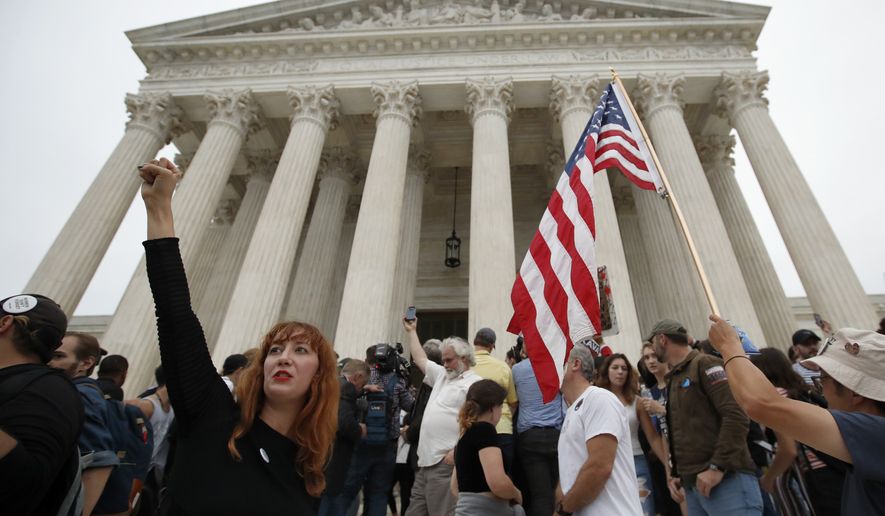By Valerie Richardson - The Washington Times - Monday, October 8, 2018
George Soros may not be passing out twenties to activists on the street, but that doesn’t mean President Trump was wrong when he accused the Democratic megadonor of having a hand in the anti-Kavanaugh protests.
Mr. Soros has been a key funder through his Open Society Foundations of a left-wing network of protest groups, including the Center for Popular Democracy, which has received millions of dollars from the Soros philanthropy and helped spearhead demonstrations against Supreme Court Justice Brett M. Kavanaugh.
“Most any left-wing group of any consequence at all is getting Soros money,” said Scott Walter, president of the Capital Research Center. “In my decades of studying left-wing groups, I almost never find a group that lacks funding from Soros.”
In a pivotal moment, Ana Maria Archila, co-executive director of the Center for Popular Democracy, and another center activist cornered Sen. Jeff Flake, Arizona Republican, in an elevator and criticized Justice Kavanaugh. Ms. Archila earned $178,071 in 2016, according to tax records on GuideStar.
Other Soros grantees involved with #CancelKavanaugh include the American Civil Liberties Union, the Human Rights Campaign, NARAL Pro-Choice America and Planned Parenthood.
Even so, Open Society was outraged when Mr. Trump described the protesters last week as “paid professionals” with “professionally made identical signs,” which he said were “paid for by Soros and others.”
“President Trump: Your tweet is incorrect — Mr. Soros does not pay people to protest — and insulting to the many women making their voices heard,” Open Society tweeted Friday. “We support the right to protest, enshrined in the 1st Amendment, and are shocked a sitting president does not share the Founders’ view.”
Activists argue that working for a recipient of an Open Society grant doesn’t make them paid protesters. Those on the ground make a distinction between random individuals receiving cash to show up at rallies — basically mercenaries — and career advocates dedicated to their cause who direct committed volunteers.
“Listen, I am an organizer,” Ms. Archila said on CNN. “I’ve spent the last 17 years building community organizations where people who are regular people find community, find power, we mass our resources together, we pool our money, we make signs together, we want to make sure that our government listens to us. That does not mean that we are paid or we are pawns.”
Andrew Friedman, another co-executive director of the center, said Open Society provides the center and its political arm, Center for Popular Democracy Action, with $1 million per year, which is split between the two.
That represents a small slice of the Center for Popular Democracy’s $12.5 million budget and its political arm’s $2.5 million budget in 2016, and none of the funding is directed toward protesting, he told The Washington Post.
Liberal media outlets have also pushed back. The New York Times called the “paid protester” argument “a common trope among those on the far right” and that Mr. Soros is “often falsely accused of providing the funds.”
A “fact check” from The Post gave the Trump tweet “three Pinocchios,” arguing that there was “indirect money from Soros associated with the groups that confronted senators in elevators, but it is wrong to claim the protesters were paid by Soros or directed by him.”
To conservatives, however, that is a distinction without a difference given that money is fungible and activists don’t need a memo from Mr. Soros to take to the streets against obvious targets such as the Kavanaugh nomination.
“It’s not like George Soros has to get up in the morning and call around to a bunch of left-wing groups and tell them to oppose a judge who will be a strict constructionist,” Mr. Walter said.
He said his group listened in on a conference call between anti-Kavanaugh protest groups in which they agreed to target Mr. Flake.
“They were saying on their internal calls, ‘Jeff Flake, Jeff Flake, critical target, Jeff Flake,’” said Mr. Walter. “The thing is, did George Soros call each of these groups personally to tell them? No, and he didn’t have to, because they all know that a lawless Supreme Court is critical to their agenda.”
Republicans have increasingly called into question the amateur status of the protesters who descended on the Senate and Supreme Court, often confronting senators in the halls during the tumultuous debate over Justice Kavanaugh.
“We will not be bullied by the screams of paid protesters and name-calling by the mob,” Sen. John Cornyn, Texas Republican, said in a speech on the Senate floor.
Shawna Thomas, Vice D.C. bureau chief, provided additional confirmation Sunday when she said that some of the activists she followed were paid.
“That moment with Jeff Flake on the Hill,” Ms. Thomas told ABC’s “This Week.” “We talked to one woman who works for UltraViolet who was paid — she helped steer people in the right ways to be able to confront senators.”
She added, “There were people who were paid by organizations like UltraViolet to try to harness that energy in a way that would make the viral moments that we ended up seeing.”
The Media Research Center’s Brent Bozell commended her forthrightness. “Honesty broke out on Sunday,” he said. “Yes, you can find protesters who are paid to create ‘viral’ moments of protest.”
Ms. Thomas later clarified her comments, saying there were “some official organizations in the mix who have staff & consultants that were part of these protests.”
“And some of them were helping individuals with tactics,” she tweeted. “That is not the same as ppl being paid to protest who don’t care about this issue.”
That doesn’t negate the fact that some protesters are paid, say conservatives, and that Soros-funded groups are helping call the shots.





No comments:
Post a Comment